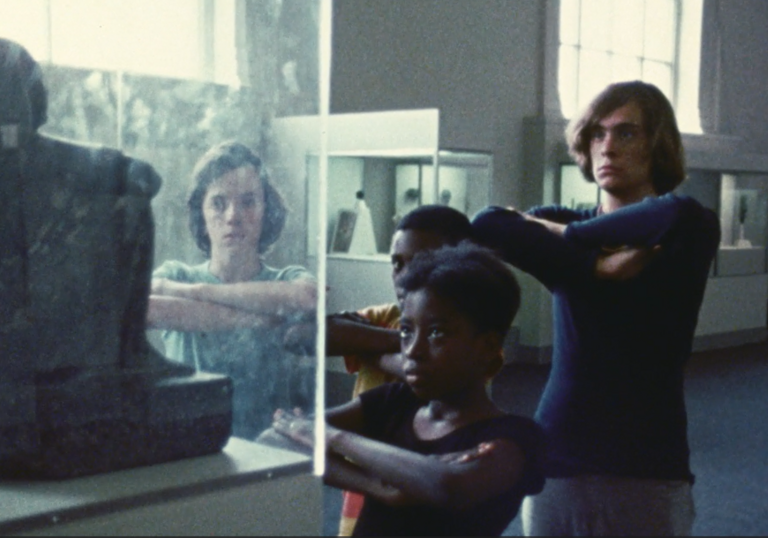
A programme of humanistic documentaries by St. Clair Bourne, presenting multi-faceted portrayals of African Americans from the 1960-1990s.
The transformative documentaries of St. Clair Bourne (1943 - 2007), a Black filmmaker and activist from Brooklyn. Diving into a range of issues from The Troubles in Ireland to race and museums.
This programme brings the UK premiere of the restored The Black and the Green, in which St Clair Bourne traces a group of Black Civil rights activists who travel to Northern Ireland during The Troubles, exploring the parallels between their experiences of racial discrimination in the US, and of Irish Catholic life under the British authorities.
The occasion of the restoration provides an opportunity to showcase the career of Bourne, whose work provides a vital perspective of African American communities between the 1960s - 1990s, a period taking in the end of the civil rights movement and transition to the Black power movement, and its rise and fall.
The Black and the Green (UK Premiere)
Dir. St. Clair Bourne, 1983, 44min
Statues Hardly Ever Smile
Dir. Stan Lathan, 1971, 21min
Something To Build On
Dir. St. Clair Bourne 1971, 30min
The title 'Cinema of Solidarity' is credited to Yasmine Price.
With thanks to Jacob Perlin.
This is a past event. Subscribe to our newsletters to hear about upcoming events
Booking fees
£1.50 booking fee per online/phone transaction.
No fee when tickets are booked in person.
Booking fees are per transaction and not per ticket. If your booking contains several events the highest booking fee will apply. The booking fee may be reduced on certain events. Members do not pay booking fees.
St. Clair Bourne
Bourne's work is defined by his time working on Black Journal, a Black produced TV programme, broadcast on public access television, which was politically and formally forward thinking, providing opportunities for young filmmakers to hone their craft telling Black stories otherwise ignored.
In this programme, the films we screen, reflect this characteristic, demonstrating his nuanced storytelling approach and belief in developing documentaries capable of giving spaces to layered, multi-faceted perspectives on deeply important issues.
His work is characterised by what Bourne describes as ‘humanistically political’, a radical formal approach, mixed with his deep sense of humanity and a belief in the transformative power of the documentary to inform, educate and uplift.
Programme
Statues Hardly Ever Smile
Dir. Stan Lathan, 1971, 21min
Shot by Bourne, this film captures an initiative at the Brooklyn Museum, which sees a group of inner city children devise a dance piece in response to the Museum’s collection. The resulting film is a poetic examination of the relationship between a museum, and its place in the surrounding community.
Something To Build On
Dir. St. Clair Bourne 1971, 30min
In this short, Bourne puts together a multi-layered reflection on the role that college should play in the Black community. Bringing many contrasting perspectives, the film hears from the experiences of young people from many different institutions, to capture the shortcomings of both the education system, and its alternatives, in shaping young Black minds.
The Black and the Green
Dir. St. Clair Bourne, 1983, 44min
St Clair Bourne’s fascinating documentary tracing a group of Black Civil rights activists, who travel to Northern Ireland during The Troubles, to explore the parallels between their experiences of racial discrimination in the US, and of Irish Catholic life under the British authorities.
See more film for less
Cinema 3
Location
Barbican Cinema 2 & 3 are located on Beech Street, a short walk from the Barbican’s Silk Street entrance. From Silk Street, you’ll see a zebra crossing that will take you across the road to the venue.
Address
Beech Street
London
EC2Y 8DS
Public transport
The Barbican is widely accessible by bus, tube, train and by foot or bicycle. Plan your journey and find more route information in ‘Your Visit’ or book your car parking space in advance.
We’ve plenty of places for you to relax and replenish, from coffee and cake to wood-fired pizzas and full pre-theatre menus
Access
Cinemas 2 & 3 are located at Beech Street, a short walk from the Barbican Centre’s main Silk Street entrance. There are a couple of steep, dropped kerbs and an incline to negotiate between the two sites. Level access from Beech Street.
Mobility
Each auditorium has three permanent wheelchair spaces (two in the third row and one in the front row) and 153 fixed seats with capacity for a further three spaces in the front row. Access to each auditorium is up a ramp. There are also a number of seats with step-free access.
Assistance dogs
Assistance dogs may be taken into the cinema – please tell us when booking to ensure your seat has enough space. If you prefer, you may leave your dog with a member of the foyer staff during the performance.
Hearing facility
An infrared system for hard of hearing customers is provided in each auditorium; headsets or neck loops can be collected from foyer staff. The ticket desk counter is fitted with an induction loop.
For more access information, please visit our Accessibility section.





